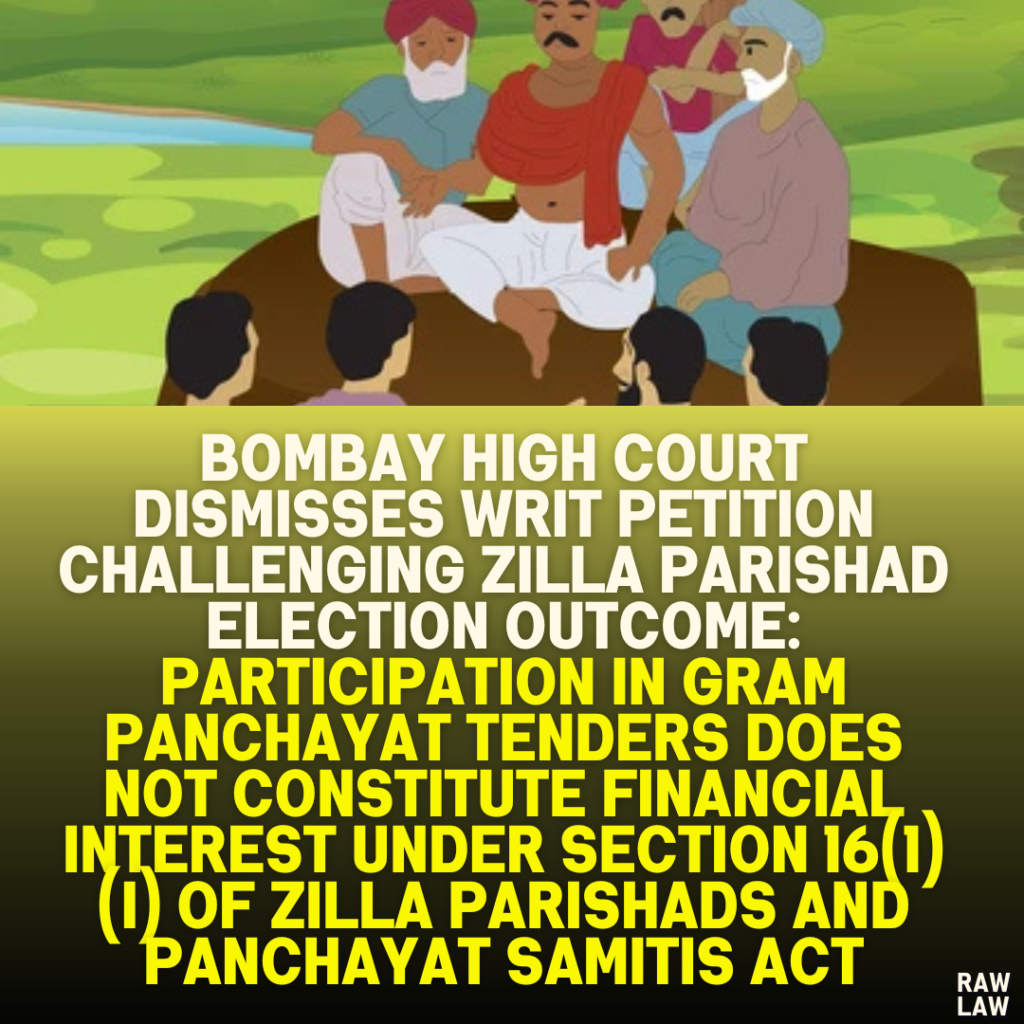Court’s Decision
The Bombay High Court dismissed the writ petition filed by a candidate challenging the election of another candidate to the Zilla Parishad. The petitioner alleged that the respondent incurred disqualification under Section 16(1)(i) of the Zilla Parishads and Panchayat Samitis Act, 1961. The court held that the respondent’s alleged “interest in work” did not meet the statutory requirements for disqualification.
Facts
- The petitioner and the respondent contested a bye-election for a Zilla Parishad seat in Sawargaon Constituency, Nagpur District.
- The respondent, a registered contractor for the Gram Panchayat, had participated in tenders floated by the Gram Panchayat but did not execute any work orders during the relevant period.
- The petitioner objected to the respondent’s nomination, arguing that her status as a contractor violated Section 16(1)(i), which disqualifies individuals with a financial interest in work done by order of the Zilla Parishad.
- The Election Officer overruled the objection, and the respondent was elected.
- The petitioner filed an application before the Divisional Commissioner, which was rejected on grounds that the respondent had no active work orders during the nomination period. The petitioner then filed a writ petition in the High Court.
Issues
- Does participation in Gram Panchayat tenders constitute a financial interest under Section 16(1)(i) of the Zilla Parishads and Panchayat Samitis Act, leading to disqualification?
- Can tenders issued by the Gram Panchayat be attributed to the Zilla Parishad for disqualification purposes?
Petitioner’s Arguments
- Broad Interpretation of Disqualification: The petitioner argued that the respondent’s status as a registered contractor and her participation in tenders indicated a subsisting financial interest in Zilla Parishad work.
- Precedent Support: Cited Virendrasing vs. Additional Commissioner, where the Supreme Court emphasized an expansive interpretation of disqualification clauses to prevent financial patronage.
- Emphasis on Legislative Intent: Argued that Section 16(1)(i) disqualifies individuals with any financial interest, direct or indirect, in Zilla Parishad work, even if actual execution is absent.
Respondent’s Arguments
- Gram Panchayat Independence: The respondent contended that the tenders were issued by the Gram Panchayat, not the Zilla Parishad, making Section 16(1)(i) inapplicable.
- Lack of Financial Interest: Asserted that no work orders were executed, and the tenders did not translate into financial gains or active contracts during the nomination period.
- Narrow Interpretation: Cited Shrikant vs. Vasantrao, where the Supreme Court held that disqualification must be strictly tied to contracts involving the authority specified in the statute.
Analysis of the Law
- Section 16(1)(i): Disqualifies individuals with a financial “share or interest” in work done “by order of the Zilla Parishad” or “in any contract with, by, or on behalf of the Zilla Parishad.”
- Interpretation of “Interest in Work”: The court emphasized that for disqualification, there must be a direct connection between the work and the Zilla Parishad. Work or tenders related to the Gram Panchayat do not fall within the ambit of this provision.
Precedent Analysis
- Virendrasing Case: The Supreme Court emphasized expansive disqualification provisions but tied them to work done by the Zilla Parishad specifically.
- Shrikant Case: Distinguished contracts with local authorities from those with the Zilla Parishad, stating that disqualification provisions must be narrowly construed.
Court’s Reasoning
- No Link to Zilla Parishad Work: The court found no evidence that the respondent had executed any work or derived financial benefits under a Zilla Parishad order.
- Limited Scope of Section 16(1)(i): Highlighted the distinction between the Gram Panchayat and the Zilla Parishad, noting that disqualification provisions must be strictly applied.
- No Grounds for Disqualification: The petitioner’s interpretation of Section 16(1)(i) as including Gram Panchayat tenders was rejected as overly broad and inconsistent with the statutory framework.
Conclusion
The court dismissed the petition, ruling that the respondent did not incur disqualification under Section 16(1)(i). The petitioner failed to establish any financial interest by the respondent in work done under the Zilla Parishad’s authority.
Implications
This judgment reinforces the strict interpretation of disqualification provisions under Section 16(1)(i). It ensures that candidates are not disqualified based on tenuous connections to unrelated contracts, protecting the integrity of election outcomes and clarifying the legislative intent of disqualification clauses.



